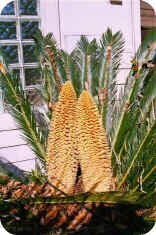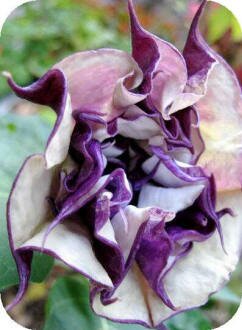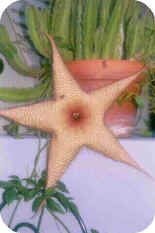Wicked Plants at EmilyCompost
Amy Stewart has written a vicious diatribe about some of our favorite plants.
At EmilyCompost we do not lack awareness (or empathy).
Many of you have written to ask us if certain plants are safe or if you should keep your dogs, cats, or children away from them. We've tried to inform readers when one of our garden gems is poisonous.
Can we help it if many of our precious progeny kill people?
Yet, until we read "Wicked Plants" by Amy Stewart we never realized how many wicked ones lived on our web pages (and, after all, in our yard and in our hearts).
If Captain Renault turned to us he might have said, "I am shocked! Shocked to find that you have poisonous plants here."
 So, we present a review, inspired by Amy Stewart, of our favorite "wicked" plants.
So, we present a review, inspired by Amy Stewart, of our favorite "wicked" plants.
Some Wicked Plants
On page one of "Wicked Plants" we take a hit. Monkshood, which killed young Canadian actor Andre Noble in 2004, appears on Ed's Wildflower Page.
Next to the Monkshood appears the Rhododendron. An acquaintance had rhododendrons planted amongst the pines in her back yard. She also let her dogs run in the yard. The dogs ate the rhododendrons to the ground. She buried the dogs in a plot behind the recovering shrubs.
By the way, do not eat the Azalea, either. It is a relative of the Rhododendron.
On Ed's Wildflower Page Two is the Cardinal Flower or Lobelia. Also poisonous.
"Wicked Plants" mentions the Nightshade family frequently. Who would dare to pick on the family members: tomatoes, peppers, potatoes, and eggplants? Sounds like a good ratatouille. But when you hang around with relatives like tobacco, datura (we called this one a cow killer), habanero chile, and angel trumpet, you get a bad reputation.
We love the datura and related angel trumpet. The datura seed pods are beautiful and the various shades of trumpet flowers grow upwards. They are easy to propagate (a weed, after all) but seriously poisonous. The angel trumpet flowers hang down from large shrubs or trees. Easy to germinate a seed and with a little care it will grow into a tree, which will bloom the first year.
As wicked houseplants, Ms Stewart lists some of our favorites. The Peace Lily is not a lily and you should not eat it. The same for English Ivy, Philodendron, the Rubber Tree (avoid the sap), and the Pencil Cactus.
We grow the peace lily, the rubber tree, and the philodendron indoors and out (in higher zones) and have never worried about our cats eating them. Cats seem to be a little smarter than dogs or children in their dietary habits. However, you’re on your own with dogs or kids.
We call dieffenbachia, Dumb Cane, because it numbs your tongue before it kills you. You cannot call for help.
Similarly, the Mother-in-law's Tongue -- named because you feed it to your better half's Mom to shut her up.
Although the dieffenbachia looks like it could go well in a salad, the Mother-in-law's Tongue (snake plant or sansevieria) does not look appetizing. Your mother-in-law is not likely to voluntarily eat these.
 Avoid These Plants, Also
Avoid These Plants, Also
Besides the Datura and Angel Trumpet, we told you not to eat these yard plants!
The Poinsettia is not as bad as its reputation, but the press needs something to write about around the holidays. We have a recipe on the Elephant Ear page. Don't try it. Do not eat the Agave (but you might try to make tequila), or the Hydrangea, Lantana, nor the Sago Palm.
Let's be fair to the Agave (century plant). It is not poisonous. But it does gain a place on the list for a reason. It is hazardous. Do not attempt to transplant the agave if you're taking blood thinners -- you are liable to bleed to death from razor cuts.
Another plant that qualifies as wicked for its annoyance value is kudzu, which Amy Stewart describes as "destructive." Anybody in the Carolinas who mentions kudzu does so with the same passion as they discuss Sherman and Hugo.
Like the Agave and the Kudzu, many of our least favorite plants will not kill you, but merely annoy you.
You might wish you were dead if you rub up against the nettle. We call it "tread lightly" for a reason.
Poison ivy, which is not an ivy but a relative of the cashew, does not poison. It provokes an allergic reaction (like we care).
Famous People
"Wicked Plants" references Tom Ogren's book, "Allergy Free Gardening."
Also quoted at length in Amy Stewart's book is Pliney the Elder. We interviewed him a few years ago.
Hallucinogens
At EmilyCompost we have never discussed any of our favorite hallucinogens (you're not going to count Agave, are you?) but the beautiful Morning Glory is on Amy Stewart's hallucinogen list. That surprised us. You never know who your favorite plant associates with, do you?
 Speaking of hallucinogen plants, check out our mushroom page. Some are poisonous, but we'll let you guess which.
Speaking of hallucinogen plants, check out our mushroom page. Some are poisonous, but we'll let you guess which.
"Wicked Plants" dealt with odor. But Amy missed two of our favorite smelly plants: the Dutchman's Pipe and Star Fish Cactus.
We used to move the star fish cactus indoors for the winter. A serious mistake if it has not yet bloomed. The plant's nickname is the carrion plant. Enough said.
All the plants mentioned are potential pet problems. But some of our favorites showed up on Wicked Plants "pet dangerous" list, including, aloe, tulip, dieffenbachia, kalanchoe, lilies, and nandina. These plants must look especially delicious to cats.
Body Count
On her web site Amy Stewart explains she had to be selective for the book. Wicked plants are numerous. To secure a place, the plant had to have a verified body count.
So, in the interest of complete openness (ignoring body count deficiencies) we submit a few poisonous plants from the EmilyCompost pages that did not make the Wicked plant book. The agapanthus or Lily of the Nile is also not a lily. The coral bean -- hummingbirds love it, but the seeds are poisonous. The Air Potato looks like a weed and only some of the species are poisonous (your guess). The Desert Rose is beautiful to look at, but alas, poisonous. Finally, the milkweed (monarch's love them), trumpet vine (beautiful - don't eat it), and sickle pod (ugly - why you would eat this is beyond us).
That's our roundup of EmilyCompost's "Wicked Plants."
Happy Gardening! And remember, "Let's be careful out there."
Poison Plant Sites
Web sites for poison plants:
http://www.ansci.cornell.edu/plants/index.html
http://www.vth.colostate.edu/poisonous_plants/report/search.cfm
ProFlowers has an excellent list of 199 Poisonous Plants here.
Read a review of Amy Stewart's book, "Wicked Plants" here (like this wasn't enough??)